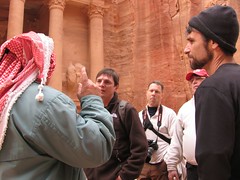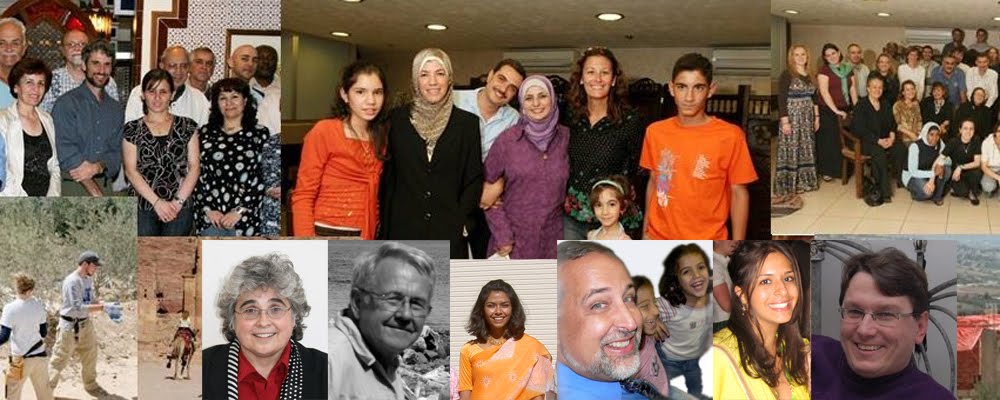By Liz McWhirter
There’s a nervous energy in the air. John Samples slows his sentence, stumbles around his next words, prefaces them with, “Allow me to use a term . . . hopefully, without the negative . . .”
Then, he drops it—
“Evangelical pastors.”
I look up at the eight other people listening to him. They’re all sitting quietly, smiling, waiting for the rest of the sentence.
John Samples’ words refer to the faith leaders he works with as Executive Director of the Christian HolyLand Foundation. Perhaps he’s exaggerated the need for semantic sensitivity in this setting, but what do you expect in a room of Muslims and Christians discussing faith and the Middle East? It’s risky business speaking up in a group like this. But that’s what I like about these people—they’re risky.
Risky because they’ve all signed up to travel to Jordan, Israel, and the West Bank of Palestine in a group comprised of members from the Christian, Jewish, Muslim, and Hindu faiths. On December 27th this very mixed copany will be heading to one of the dicier regions of the world, a place where faith lines divide the land like livewires.
The group’s trip is supported by the
International Interfaith Initiative, an Indianapolis-based organization that promotes multi-faith collaboration in order to stimulate creative cooperation and strengthen civil society. The group will be eleven strong on the day of departure, but tonight, only six of them (plus a few intrigued listeners) have gathered here in this cozy Broad Ripple abode to discuss their upcoming travels.
As I listen to these excited travelers (many of whom are meeting one another for the first time), it’s clear to me that I’m witnessing the planting of the first seedling of several fruits this trip will inevitably bear. Tonight’s meeting marks the beginning of an exchange of information, a running dialogue that will continue to deepen as they travel across sacred lands. The bond that will form, the friendships that will develop across faith lines . . . well, it’s inspiring.
But a unique bond and an enlightened global perspective are not the only positive outcomes these travelers seek. They also hope to positively change the people they encounter—whether by working alongside Palestinian refugees on a community project in the West Bank, or communing over dinner with Iraqi refugee families in Amman. At the very least, the group will simply be present for people, ready and eager to listen and learn from their stories of daily life and war, of struggle and of hope.
I ask the trip’s travel guide, Kelly Campbell, co-founder of the Indianapolis-based international travel and trade company
The Village Experience, why they have chosen to travel as an interfaith group. She points out that most single-faith groups traveling to the Mid East visit only those areas connected to their particular faith; they usually see only those projects their congregations support. A mixed-faith group, Kelly believes, will branch out, will explore areas important to all the group members’ faiths.
And she should know: Kelly’s been on this trip once before—in June 2008 the International Interfaith Initiative took their
first trip to the Middle East, returning with a passion to support and encourage the remarkable grassroots initiatives they saw working across the region.
It’s evident that the people gathered together tonight are approaching this trip as learners and observers, not as teachers, or Westerners with answers. Their itinerary is chock-full of meetings with peace workers in every place they will visit—including representatives from the
Interfaith Center in Amman, several Bedouin women’s projects in Tel Sheva and Lakiya, the
Center for Jewish-Arab Economic Development in the Negev, the
Ibdaa Cultural Center at the Dheisheh Refugee Camp in Bethlehem, and
Rabbis for Human Rights in Jerusalem.
The dialogic opportunities this trip provides would likely be applauded by Egyptian interfaith activist Mohamed Mosaad, who has said that interfaith dialogue “has to move from the five star hotels to the neighborhood mosques, churches, and synagogues. Religious people of different religious backgrounds have to meet frequently, listen to each other, communicate humanely, and share what they value the most: their individual religious and spiritual experiences.”
Though focused on experiencing the Middle East together, I learn several group members also have particular interests they hope to address during their trip. Kelly Campbell and her associate Sheila Viswanathan want to search out new handmade products from native women to sell in the Village Experience’s Broad Ripple store. Charlie Wiles, who directs the International Interfaith Initiative, is particularly interested in meeting with some of the family members of Iraqi refugees he has come to know in Indianapolis. John Samples is eager to connect with those living in the Christian communities of Israel, as he believes meeting people from the west who are willing to learn about them is a big encouragement for Arab Christians. Father Jeff Godecker, chaplain for the Catholic Community at Butler University and dare I guess the eldest member of the group, says what he’s looking forward to about the experience is, “the ability to see through somebody else’s eyes whose worldview may be very different from mine. The most attractive part [of the trip] to me is Jews, Christians, and Muslims at the same place.”
And what places they will stand together before!—Petra, the Dome of the Rock, the Church of the Nativity, King Abdullah Mosque. I ask Charlie Wiles, leader of the first interfaith Mid East trip, about the impact of seeing such sacred spaces from an interfaith context. “It’s enriching to hear how others interpret the sites we see,” he says. “For instance, when we visited the Church of the Holy Sepulchre it was helpful to hear how a Presbyterian felt about the site, or hear how the Rabbi felt about the Western Wall, and the Imam felt about the Dome of the Rock. We all gained from hearing about the perspective of others.”
One group member’s perspective will be particularly sought after during the trip. Hyam Elsaharty is a non-profit worker in Chicago and will be the sole Muslim representative in the group. She confesses at the meeting that she’s been reading, “the ‘Idiot’s’—no, ‘the Dummies,’—no wait, it’s—
Arabic for Dummies” in preparation for her trip.
Becca Huttsell, an Indianapolis resident who’s dedicated much of her career to working with the city’s juvenile offenders, cracks up and admits that she’s been reading
Islam for Dummies. Becca tells me she sees this trip as “a myth-busting mission—for all religions.” Pointing around the room, she forewarns her fellow travelers, “I’m going to pick all your brains.”
She puts it lightly, but Becca’s words get at the heart of the purpose of interfaith travel. As British Chief Rabbi Jonathan Sacks theorizes in his controversial book
The Dignity of Difference, each faith has only part of the truth. When faith groups come together, they possess more of it.
It’s possible the witness these travelers will bear to the power of interfaith harmony could make a lasting impression. Charlie Wiles notes from last year’s trip, “When people asked about the composition of our group they were impressed with our diversity . . . I feel that is something we should promote about America, that we have examples of where diversity works for the greater good.”
The interfaith approach to troubled Middle East regions has certainly gained momentum, especially since Saudi Arabia’s King Abdullah’s unprecedented announcement in March of 2008, calling for an interfaith dialogue amongst the world’s monotheistic religions.
Though much hope swirls around the words “interfaith dialogue,” for his part, John Samples is keeping things in perspective. He explains, “I am not one who believes peace for the region is right around the corner; I do not even know that it is attainable in any long-term, meaningful way. However, when the focus is on individuals, we can bring peace to families and small communities. And if there is ever to be peace in the big picture, it will be because hearts are changed in the people who will then change the leaders.”
In a word universal to the Hebrew, English, and Arabic languages: “Amen!”
Note: The five other travelers participating in the 2009 interfaith trip are: George Kelley, Sheila Viswanathan, Paul Gibson, Michael Sutherlin, and Tim Sutherlin.
 Saying that our Wednesday visit to Petra was amazing is an understatement. It is remarkable to walk through these cave homes and the temples of the people who lived and worshiped here more than 2,000 years ago. To be able to do that as part of this Interfaith group
Saying that our Wednesday visit to Petra was amazing is an understatement. It is remarkable to walk through these cave homes and the temples of the people who lived and worshiped here more than 2,000 years ago. To be able to do that as part of this Interfaith group , and to hear the various insights from the varied faith backgrounds, is a privilege.
, and to hear the various insights from the varied faith backgrounds, is a privilege. and you can find a lot more photos of this journey by clicking my flickr site here...
and you can find a lot more photos of this journey by clicking my flickr site here... and you can find a lot more photos of this journey by clicking my flickr site here...
and you can find a lot more photos of this journey by clicking my flickr site here...









